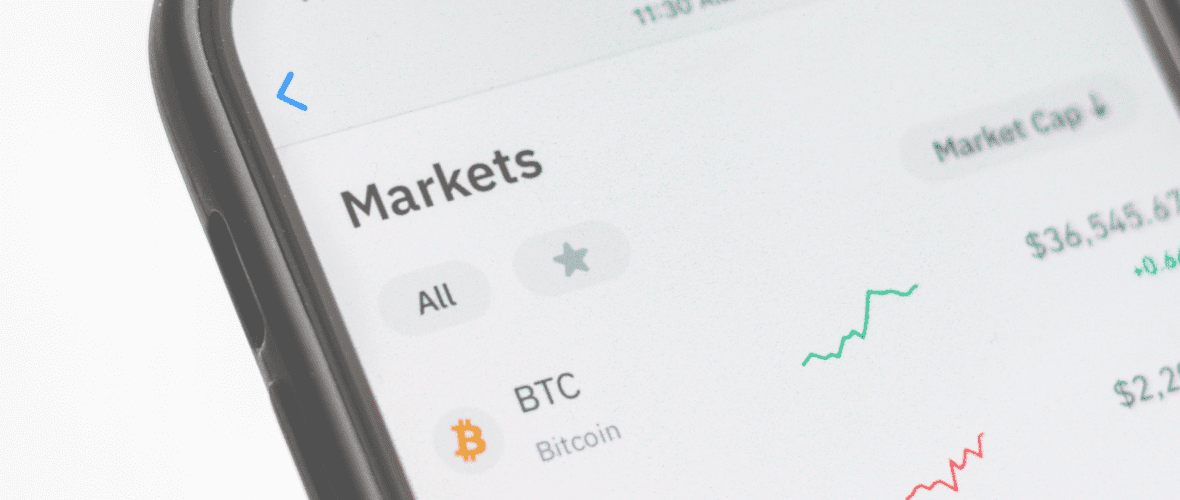Picture this: you work hard, save money, and build your nest egg, only to watch it slowly wither away in the face of rising prices. It’s a frustrating and all-too-familiar scenario, thanks to a phenomenon known as inflation. As the cost of goods and services climbs, the value of your money shrinks, leaving you with less purchasing power. But here’s the burning question: can cryptocurrencies like Bitcoin and Ethereum come to your rescue as a shield against this financial erosion?
In this article, we’ll delve into how these digital assets can protect against inflation. Cryptocurrencies, operating outside traditional financial systems with revolutionary blockchain technology, limited supply, and decentralisation, make them compelling guardians against inflation’s relentless impact. Plus, we’ll explore how Kriptomat can help you enhance your crypto investing journey.
What is inflation?
Inflation is the rate at which the general price of goods and services in an economy rises over time. When inflation occurs, each unit of currency buys fewer goods and services; essentially, the purchasing power of money decreases.
Inflation’s economic implications are vast. It can erode the real value of money, influence central bank policies, and affect consumer and business spending. High inflation rates can lead to uncertainty and discourage long-term economic planning, whereas controlled inflation is often seen as a sign of a growing economy.
Types of inflation and their causes:
- Demand-Pull Inflation: This happens when demand for goods and services outstrips supply, leading to higher prices. It’s often a sign of a booming economy.
- Cost-Push Inflation: This type occurs when the costs of production increase, and businesses pass these costs onto consumers in the form of higher prices.
- Built-In Inflation: Also known as wage-price inflation, this is driven by the expectation of workers that they need to keep their wages rising to cope with increased living costs, leading to a cycle of wages and prices chasing each other upwards.
- Monetary Inflation: Caused by an increase in the money supply that outpaces economic growth, leading to a decrease in the currency’s value and an increase in prices.
- Hyperinflation: An extreme and rapid form of inflation with very high rates, often resulting from severe monetary inflation and loss of confidence in the currency.
Each type of inflation has different causes and can affect your investments in various ways. Understanding these types can help you make more informed decisions about protecting and growing your investment portfolio in the face of changing economic conditions.
Inflation’s effects on traditional investments
Inflation is a critical factor that can significantly impact your investment portfolio. Different investment assets react to inflation in varied ways, and understanding these responses is key to effective portfolio management:
- Stocks: Inflation has a mixed effect on stocks. It can boost company profits due to higher prices but also increase costs and reduce consumer spending, potentially affecting earnings. Stocks typically perform well in moderate inflation but can face challenges in high inflation scenarios.
- Bonds: Bonds are typically sensitive to inflation. When inflation rises, the value of bond payments at fixed interest rates diminishes, leading to a decrease in bond prices. This inverse relationship makes bonds, especially long-term bonds, vulnerable in an inflationary environment.
- Real estate: Real estate often serves as an effective hedge against inflation. Property values and rental incomes usually increase with inflation, making real estate investments potentially more profitable during high inflation periods.
- Commodities: Commodities like gold and oil can benefit from inflation. These assets are often seen as a store of value that can protect against the eroding purchasing power of currency during inflationary times.
Inflation and interest rates relationship:
Central banks often respond to high inflation by increasing interest rates. Higher interest rates can lead to increased borrowing costs, affecting consumer spending and business investments.
For investors, rising interest rates can mean higher yields on new bonds but can also lead to a decrease in the value of existing bonds. Additionally, higher interest rates can dampen business growth, potentially impacting stock market returns.
To stay ahead in investments, monitor inflation indicators like the Consumer Price Index (CPI) and Producer Price Index (PPI) for pricing trends, stay updated with credible economic reports and forecasts, and keep an eye on central bank policies that impact inflation and market dynamics.
Understanding how inflation and interest rate changes affect different asset classes can help you make informed decisions about where to allocate your resources.
Unlock the power of diversification with our concise guide “How Can Different Investment Assets Diversify Your Portfolio?”.
How can cryptocurrencies ast as a hedge against inflation?
Cryptocurrencies are a bit like the money you use every day, but they exist purely in digital form. They are not issued or controlled by any central authority, like a government or bank. They rely on something called blockchain technology. Think of it as a super-secure digital ledger, where all transactions are recorded in a way that’s transparent, tamper-proof, and open to anyone who wants to see.
So, you might be wondering, “What’s the big deal? How can these digital currencies save me from the clutches of inflation?” Let’s break down why they’re such effective shields:
- Limited supply and scarcity: Unlike traditional currencies that can be printed endlessly, many cryptocurrencies have a fixed supply. This scarcity means that as demand for cryptocurrencies increases, their value tends to rise, making them a potent defence against inflation.
- Decentralisation: Cryptocurrencies operate in a decentralised manner, meaning there’s no central authority controlling them. Decentralisation safeguards your assets from manipulation and interference by external forces.
- Portability and accessibility: Cryptocurrencies are easily stored in digital wallets, making them a convenient and portable way to secure your wealth.
In countries like Venezuela and Zimbabwe with hyperinflation, cryptocurrencies became a stable store of value, preserving wealth when traditional currencies collapsed.
How to make cryptocurrencies part of your portfolio?
Incorporating cryptocurrencies into your investment portfolio can provide diversification and potential growth, but it’s important to understand how to navigate this exciting yet volatile asset class:
- Begin by clarifying your investment objectives. Are you seeking long-term wealth preservation, short-term gains, or a mix of both? Learn more about the importance of financial goal-setting in our insightful article “The Power of Financial Goal-Setting: Why It’s Essential for Your Money’s Success”
- Honest assessment of your risk tolerance is essential. Ensure your chosen cryptocurrencies match your comfort level with risk. Discover your investing style with our comprehensive guide “What Kind of Investor Are You: How to Match Investments to Your Temperament”
- Diversify your cryptocurrency holdings to spread risk and enhance portfolio stability. Explore in more detail how to effectively balance your crypto portfolio in our tutorial “How to Build A Balanced Crypto Portfolio: Strategies for Risk Diversification”.
Establish a disciplined strategy:
- Buying and holding (HODLing) means acquiring cryptocurrencies for the long term, with the belief in their potential, and riding out market fluctuations. Learn how to buy crypto on Kriptomat in our step-by-step guide: “How to buy cryptocurrencies on Kriptomat?”
- Dollar-Cost Averaging (DCA) is a disciplined strategy involving regular fixed investments, regardless of cryptocurrency prices. Learn how Kriptomat makes your DCA seamless in our tutorial “What is Recurring Buy and how does it work?”
- Active Trading: Active traders frequently buy and sell cryptocurrencies for short-term gains, requiring market analysis and involving high risk. Kriptomat offers features such as Watchlist, Price alerts, Advanced charting and Automated Buy and Sell to make your trading effortless.
Don’t forget to choose a secure cryptocurrency exchange for buying, selling, and trading. Kriptomat is a secure, user-friendly and regulatory compliant crypto exchange with a vast selection of essential and advanced trading tools. Kick-off your crypto journey with Kriptomat by reading our tutorial “Getting Started with Kriptomat”.
Risks and considerations
Before you dive headfirst into the world of cryptocurrency investments, it’s essential to be aware of the potential pitfalls and exercise prudence:
- Volatility: Cryptocurrencies are known for their price volatility. Prices can experience rapid and substantial fluctuations over short periods. It’s crucial to be prepared for this inherent risk and not be swayed by emotional reactions.
- Regulatory uncertainty: The regulatory environment for cryptocurrencies varies widely from one region to another. Changes in regulations can impact the market and may introduce legal and compliance risks.
- Security concerns: The digital nature of cryptocurrencies makes them susceptible to hacking and fraud. Storing and securing your assets properly is paramount to protect against theft or loss.
Explore in detail how to conduct a thorough crypto research with our article “From Novice to Expert: Learn to Research Cryptocurrencies”.
Stay informed about market news, regulatory changes, and technological developments that could affect your investments. Prioritise security by using reputable cryptocurrency exchanges and wallets and implementing strong security practices.
Discover a few essential tips to make your experience with Kriptomat safer in our tutorial “How to Stay Safe in Crypto: Spot and Dodge the Most Typical Scams”.
Lastly, maintain a long-term perspective, as cryptocurrencies can be volatile, and impulsive decisions based on short-term price movements may not yield the best results.
The bottom line
The impact of inflation on your investment portfolio is a critical consideration in today’s economic landscape. Rising prices can erode the value of your assets and diminish your purchasing power over time. It’s essential to be proactive in seeking out strategies that can help protect your wealth.
Cryptocurrencies, with their unique characteristics such as limited supply, decentralisation, and accessibility, offer a compelling option for safeguarding your portfolio against the ravages of inflation. As demonstrated, they have the potential to act as effective hedges and store of value in times of economic uncertainty.To further explore how cryptocurrencies can bolster your investment strategy, we invite you to explore additional educational resources on Kriptomat. Additionally, consider signing up for a Kriptomat account, where you can begin your journey into the world of cryptocurrencies with confidence.
NOTE
This text is informative in nature and should not be considered an investment recommendation. It does not express the personal opinion of the author or service. Any investment or trading is risky, and past returns are not a guarantee of future returns. Risk only assets that you are willing to lose.



 IOS
IOS Android
Android